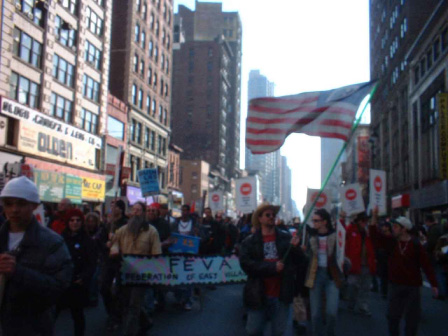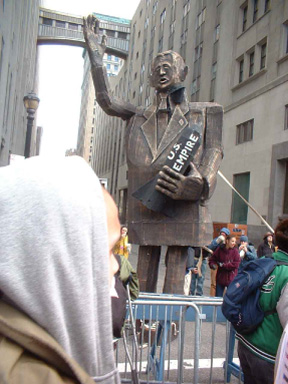HOME
ARCHIVE
SEARCH
DV NEWS SERVICE
LETTERS
ABOUT DV
CONTACT
SUBMISSIONS
A Bushless World is Possible
by Benjamin Dangl
www.dissidentvoice.org
March 23, 2004
The
demonstration on March 20th in New York City spoke out against the Bush
administration’s foreign policy not just in Iraq, but in Haiti and Palestine
as well. While New York City mayor Bloomberg said there were over 33,000
protesters in attendance, protest organizers said the number was closer to
100,000. In either case the demonstration was largely peaceful with four
arrests reported from the New York City Police.
Though I attended the march, I, like many people I know had doubts about the message proposed by the march’s coordinators, International ANSWER and United For Justice and Peace, which was to “Bring the troops home now.” We didn’t think it was practical to demand the immediate withdrawal of all troops from Iraq. After the destruction of Iraq by the armed coalition forces, the immediate withdrawal of these troops seems an impractical request and irresponsible action which could fuel a civil war by allowing opposing ethnic and religious groups to battle each other unchecked. To many of the protesters who were out in full force last year, and continue to show their support today, demanding the withdrawal of all troops immediately seems too simplistic. They argue that a multilateral solution is the best course of action until an interim Iraqi government is established.

The biggest unifying factor among activists at the March 20 demonstration appeared to be their deep hatred and mistrust of the Bush administration. “We have to get this maniac out of office so we can at least begin to clean up the mess he’s made globally and at home,” Mike, a photographer from North Carolina told me. Like many other demonstrations, however, this one was marked by the variety of issues being put on the table.
Between the Mozambique out of Burundi, Free Mumia, US out of the Dominican Republic, Legalize Marijuana and Get Corporations Off Welfare signs I spoke with various people about their reasons for demanding the immediate withdrawal of troops from Iraq. One teacher from New York told me that, “The US is exacerbating the ethnic and religious differences in Iraq, the Iraqi resistance won’t give up until the US leaves. Paul Bremer is putting constant pressure on Iraqi politicians to do things his way and so far, multinational war profiteers are making the most of the Iraqi freedom.”
Emily, a journalist from Long Island justified her opinion that troops should immediately leave Iraq by explaining that, “The US is only working with the most cooperative Iraqi political groups, and these groups don’t necessarily represent the needs of the people. By supporting one group over another, the US is creating more division among Iraqis. We need to let the Iraqi people decide how their country is run.”
It is a hard argument to refute. Though many like the idea of greater UN involvement in a multilateral peace keeping force, as the organization that implemented the devastating trade embargo on the country for so long, the UN would hardly be a welcomed group either. With the transfer of power to the an interim Iraqi government planned to take place this June 30th and general elections for a transitional assembly scheduled for January 2005, it is possible that the situation in Iraq may improve, however with the daily bombings and shootings, it does not look likely.
Though the majority of activists that I spoke with were for pulling all troops out of Iraq immediately, there were many that thought otherwise. Kate, from New Paltz, NY said, “Coalition forces have completely demolished any form of government and infrastructure in Iraq. We can’t just pull out now after what we’ve done, it will just be breeding ground for terrorism.”

Tyler, from Monroe, NY agreed, “Immediate evacuation of troops would not help the area at all. We shouldn’t have been there in the first place but now that we are there, we definitely need to give the Iraqi people their power. The reason there are so many suicide bombings and insurgents is because they don’t want us there. Now that Saddam isn’t in power they probably feel that they can run their country in a proper manner and I don’t think we are allowing them to do that.”
But what do the Iraqi people have to say? The BBC recently conducted a poll in which of the 2,652 Iraqis surveyed, 39% support the presence of coalition forces in Iraq, 36% said they should stay in Iraq until an Iraqi government was in place, 15% said troops should leave immediately and 17% considered attacks on coalition forces acceptable. In another survey, 72% of the citizens supported Iraqi democracy, while 10% supported a coalition provisional authority. These polls suggest that, once again, nothing is ever as black and white as many would like it to be.
So where does that leave the peace movement? Can it responsibly demand the withdrawal of all troops immediately, or should it push for a multilateral approach to transferring power to the Iraqi people as quickly as possible? The desperation with which the US government seems to be pushing for an interim government can’t be looked on with less suspicion than their desire to go to Iraq in the first place. It is hard to believe that any government that the Bush administration sets up in Iraq will, as Emily said, represent the needs of the Iraqi people. Yet who knows, next year the activist slogan might be: “Peacekeeping troops back to Iraq! You made the mess, now stay and clean it up!” While every death, both Iraqi and American, is a tragedy, the complexity of the situation in Iraq shows that the peace movement should not simplify its demands to “Bring All Troops Home Now”.
At the end of the March 20, 2004 demonstration in NYC, I had only come upon one clear direction in which the peace movement is already headed: to the polls to oust Bush from power. Not just for the sake of the US, but for the sake of the world, for the people in Iraq, Haiti, Palestine and elsewhere. The peace movement, as we near Election Day, will hopefully coalesce into an even broader movement with a message which everyone can rally behind: A Bushless World Is Possible.
Benjamin Dangl is an activist/writer and editor of The Upside Down World news at www.UpsideDownWorld.org.